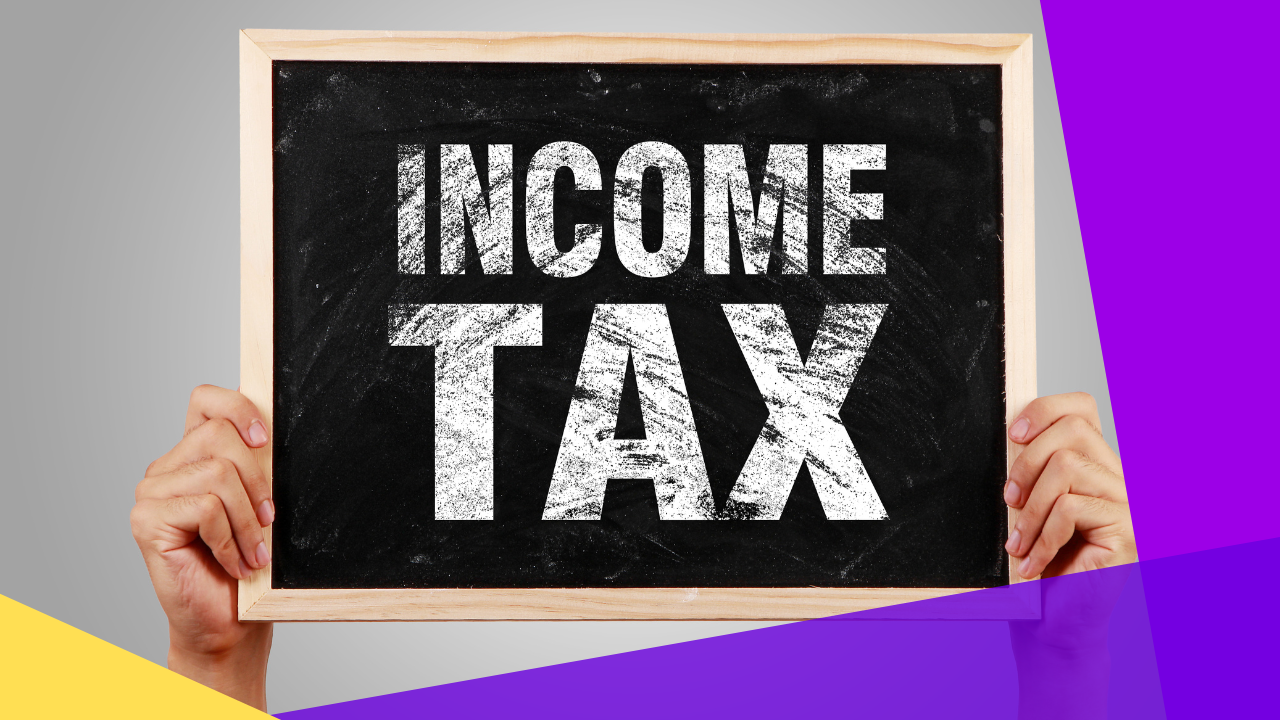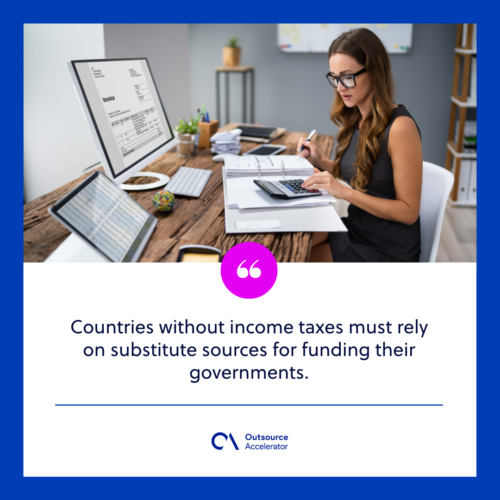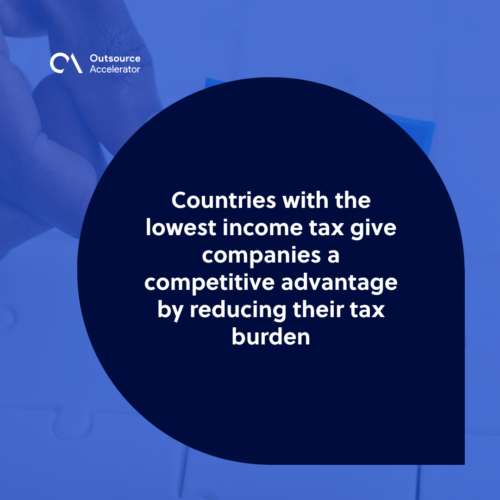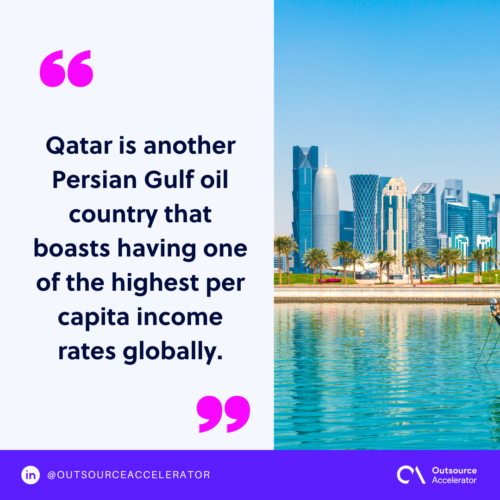Countries with the lowest income tax: A guide to tax-friendly nations

List of countries with the lowest income ta
Income taxes can undoubtedly eat up a large portion of your bottom line. For this reason, many businessmen choose to become citizens of one of the world’s lowest-income tax countries. These income tax-lenient countries make for an attractive business environment for entrepreneurs wanting to make the most of their profits. Read below to see which countries offer the best combination of low to zero-income tax and economic stability.Tax-free country: How is it possible?
Countries that don’t impose income taxes may seem too good to be true when you hear it for the first time. After all, taxes are the lifeblood of a country’s economy and the government’s source of funds. However, some circumstances allow some countries to forgo entirely the need to levy taxes on their citizenry’s income. Some of the reasons why the lowest-tax countries can operate the way they do are listed below.Alternative sources of income
Countries without income taxes must rely on substitute sources for funding their governments. These sources can include natural resources (e.g., oil reserves, ores and minerals, and natural gases) that generate substantial income through exports and royalties. Additionally, some countries can also keep themselves economically afloat through their thriving tourism industry. The sheer bulk of tourism-related activities (e.g., accommodations, attractions, and transportation) generate enough income for the country’s government to waive income taxes from its citizens. Through these diversified sources of income, nations can afford to be listed among the countries with the lowest income tax without compromising economic stability.Tax haven status
Some of the countries with the lowest income tax (or no income tax at all) intentionally position themselves as such to attract foreign investors and businesses. These territories foster a favorable environment for entrepreneurs. They incentivize corporations and private individuals to entice them into establishing businesses or residences within their borders. These tax haven countries supplement their loss of income taxes through other means. These include collecting fees for financial services, company registration fees, or imposing taxes on specific incomes (e.g., dividends).Subsidies from other entities
There are cases wherein the lowest-tax countries receive subsidies or financial assistance from other entities. These entities may include larger nations or international organizations that provide economic aid. Because of this external economic support, some countries can offset the loss of income tax revenue and maintain public order, infrastructure development, and social welfare projects.Limited government expenditures
Another way nations on the lowest tax countries list can afford their tax policies is by keeping government spending lean. They keep a tight lid on their national coffers and prioritize essential services while minimizing unnecessary expenditures. By keeping government spending in check and avoiding excessive bureaucracy, these countries can keep their economies firm without relying on income tax revenues.
Lowest tax countries vs. Tax-free countries
Although completely tax-free countries do exist, there is still only a handful of them today. The most notable of them include oil-rich Middle Eastern nations, such as the United Arab Emirates (UAE), Qatar, and Kuwait. These countries do not collect personal income taxes from their citizens. However, it’s worth noting that they still levy corporate taxes to varying degrees. The tax systems between the lowest tax countries and tax-free ones differ from each other. Tax-free nations have a rather straightforward system where citizens pay no income taxes whatsoever. On the other hand, the lowest-tax countries use a territorial tax system wherein local sources of income are taxed. In short, expats living in the lowest-tax countries won’t have to pay taxes for their income from their business in their former countries. However, they’ll have to pay income taxes for revenue sources within their new country.Advantages of the lowest tax countries
Operating in countries with the lowest income tax can bring many benefits to businesses besides the obvious tax cuts. These advantages include:Cost savings and increased profits
Countries with the lowest income tax give companies a competitive advantage by reducing their tax burden. With reduced corporate tax rates, businesses can retain a larger portion of their revenue. In turn, the tax reductions translate into more profit and enhanced cash flow, which owners can reinvest into their company for further growth.Attracting investments and talent
The lowest-tax countries attract investors and top talents in the same way they have lured company owners into investing within their territories — by offering favorable environments. By establishing themselves in countries with the lowest income tax, businesses can position themselves as attractive investment opportunities. Additionally, they’ll also be likely to attract top talents seeking better financial opportunities and higher take-home pay.Stimulating economic growth and entrepreneurship
Countries with the lowest income tax rates promote entrepreneurship and business development. By reducing the tax burden, governments foster a culture of innovation and risk-taking. Entrepreneurs will be more likely to make more ventures when they’re assured that taxes will not heavily dent their profits. This leads to an increase in business activity, the creation of more jobs, and economic growth.Favorable regulatory environment
The lowest-tax countries often have business-friendly regulations in place. These nations’ governments understand that attracting foreign companies and investors takes more than just tax cuts. That’s why they implement streamlined processes, reduce bureaucracy, and create flexible labor laws that facilitate business operations. This favorable regulatory climate simplifies compliance, reduces administrative burdens, and allows businesses to focus on their core operations.
Lowest tax countries as of 2023
There are many countries you can choose from if you want to reduce your income tax burden. The list of countries with the lowest income tax rates ranges from the oil-rich kingdoms of the Middle East to former British territories in the Caribbean. Some of them, such as Antigua and Barbuda, offer foreigners a relatively easy path to citizenship. However, it can be difficult (if at all possible) to gain citizenship for some of the other countries with the lowest income tax. Take a look at some of the world’s lowest-tax countries.1. United Arab Emirates (UAE)
Known for its massive oil reserves and thriving economy, the UAE counts itself among the countries that impose zero income tax. Additionally, the Arab country has no taxes for legal entities but is planning to introduce a 9% federal corporation tax for businesses with high net profits. Aside from this, the UAE imposes corporate taxes on oil companies and foreign banks. The country considers foreigners with residence visas as tax residents. However, one must stay within the country for 180+ days to obtain a Tax Residency Certificate.2. The Bahamas
A world-renowned tourist destination, the Bahamas can afford to not tax its citizens’ income due to the country’s tourism sector. Individuals wishing to gain residence in the country must be prepared to spend quite a sum of money to expedite the process — at least USD 750,00 in investments. They must also stay in the country for a minimum of 90 days and maintain a residence’s ownership for at least ten years.3. Bahrain
Like the UAE, Bahrain is an oil-rich country that can afford to forgo income tax collection because of its export revenues. Gaining permanent residence in Bahrain can be somewhat difficult. Aside from the required investment of at least USD 530,000 in property, one must also be retired — somewhat complicating the process for businessmen. Being granted citizenship is an entirely different story from being a resident of Bahrain. Interested individuals are required to be fluent in Arabic and must have lived in the country for 25 consecutive years.4. Qatar
Qatar is another Persian Gulf oil country that boasts having one of the highest per capita income rates globally. The country does not levy income taxes. However, it still imposes a 10% corporate income tax on businesses and a 5% value-added tax (VAT) for goods purchased outside the Gulf Cooperation Council (GCC).







 Independent
Independent




